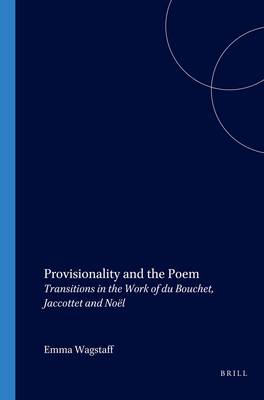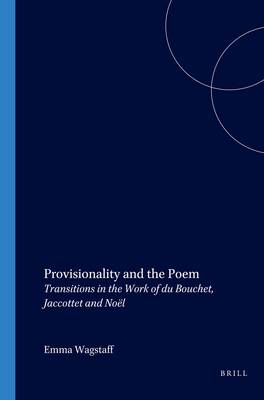
- Afhalen na 1 uur in een winkel met voorraad
- Gratis thuislevering in België vanaf € 30
- Ruim aanbod met 7 miljoen producten
- Afhalen na 1 uur in een winkel met voorraad
- Gratis thuislevering in België vanaf € 30
- Ruim aanbod met 7 miljoen producten
Zoeken
€ 121,45
+ 242 punten
Omschrijving
Much poetic writing in France in the post-1945 period is set in an elemental landscape and expressed through an impersonal poetic voice. It is therefore often seen as primarily spatial and cut off from human concerns. This study of three poets, André du Bouchet, Philippe Jaccottet and Bernard Noël, who have not been compared before, argues that space is inseparable from time in their work, which is always in transition. The different ways in which the provisional operates in their writing show the wide range of forms that modern poetry can take: an insistence on the figure of the interval, hesitant movement, or exuberant impulse. As well as examining the imaginative universes of the poets through close attention to the texts, this book considers the important contribution they have made in their prose writing to our understanding of the visual arts and poetry translation, in themselves transitional activities. It argues that these writers have, in different ways, succeeded in creating poetic worlds that attest to close and constantly changing contact with the real.
Specificaties
Betrokkenen
- Auteur(s):
- Uitgeverij:
Inhoud
- Aantal bladzijden:
- 244
- Taal:
- Engels
- Reeks:
- Reeksnummer:
- nr. 278
Eigenschappen
- Productcode (EAN):
- 9789042019393
- Verschijningsdatum:
- 1/01/2006
- Uitvoering:
- Paperback
- Formaat:
- Trade paperback (VS)
- Afmetingen:
- 155 mm x 234 mm
- Gewicht:
- 349 g

Alleen bij Standaard Boekhandel
+ 242 punten op je klantenkaart van Standaard Boekhandel
Beoordelingen
We publiceren alleen reviews die voldoen aan de voorwaarden voor reviews. Bekijk onze voorwaarden voor reviews.








